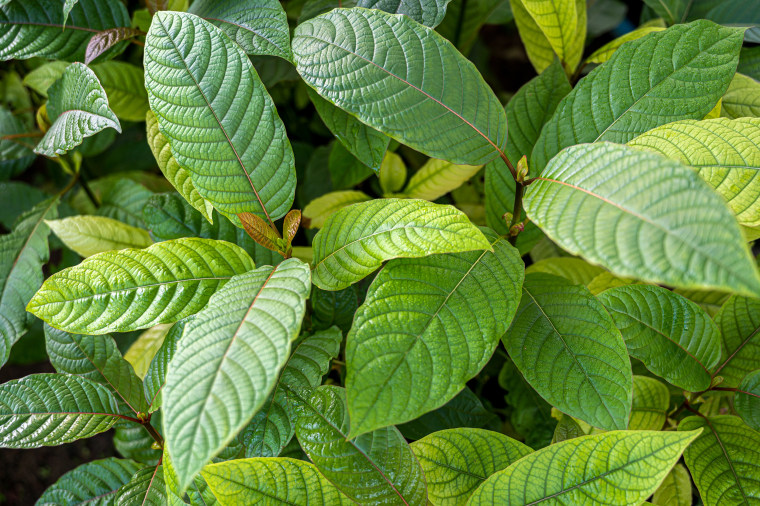The family of a woman who died after taking kratom, an herb with opioid-like effects, was awarded $11 million last week in a wrongful death lawsuit against a company that sold the substance.
Krystal Talavera, a 39-year-old mother of four who lived in Florida, collapsed in her kitchen while preparing breakfast for her family in June 2021. By her side was an open package of kratom with a handwritten “Space Dust” label.
The Palm Beach County Coroner attributed Talavera’s death to “acute mitragynine intoxication.” Mitragynine, one of two main chemical compounds in kratom, produces classic opioid-like effects at high concentrations, such as sedation, nausea, vomiting, addiction and difficulty breathing, which may be fatal.
Although the FDA has not approved kratom for sale in the U.S., the herb operates in a grey area of the law and is often sold online or at convenience stores and gas stations, usually in the form of capsules or loose powder. Several states, including Alabama, Arkansas and Wisconsin have banned kratom though.
The Food and Drug Administration has warned consumers not to use kratom because it carries a risk of liver toxicity and seizures and can lead to substance use disorder. Advocates of kratom, however, say it’s useful for pain management and can help people with substance-use disorders wean off more dangerous opioids like heroin.
Talavera was taking kratom for pain management before her death, according to Tamara Williams, a lawyer at mctlaw representing Talavera’s estate.

“Never in a million years did she think that the kratom would kill her,” said Williams, whose firm represents families in wrongful death lawsuits against kratom manufacturers, distributors and vendors.
While the purported benefits of kratom have been studied — mostly in animals — medical experts say the science isn’t conclusive yet. A lack of federal regulation also means the product may be contaminated with lead or heavy metals or contain dosages that are hazardous to consume.
“Most kratom users don’t realize how unregulated it is whenever they’re using it,” said Dr. Peter Grinspoon, a primary care physician and cannabis specialist at Massachusetts General Hospital.
“At the same time, I do think it’s really sad how desperate people are because we’re under-treating chronic pain and we’re under-treating addiction and a lot of this is just really coming out of people’s sheer desperation,” he added.
1.7 million users
According to the National Survey on Drug Use and Health, around 1.7 million people 12 and older in the U.S. used kratom in 2021. The vast majority have not experienced life-threatening side effects or died.
Kratom was the cause of death in just 91 out of more than 27,000 overdose deaths from July 2016 to December 2017, according to an analysis from the Centers for Disease Control and Prevention. Around 80% of those kratom-related deaths had a history of substance misuse, the report found.
Grinspoon said kratom isn’t known to cause many overdoses, so he questioned whether it was the sole culprit in Talavera’s death, or played a role at all. The FDA says kratom use has been associated with death “in rare cases,” but those cases usually involved other drugs as well.
“Tons of people use it and these horror stories are few and far between, but they are pretty awful horror stories,” Grinspoon said.
After Talavera’s death, her son Devin Filippelli sued Grow LLC, a kratom distributor that operates under the name The Kratom Distro, as well as the company’s owner, Sean Michael Harder on behalf of himself, his three siblings and his mother’s estate.
The lawsuit, filed in November, alleged that Harder and his business were responsible for Talavera’s death because they marketed the product as an all-natural supplement without warning consumers of its potential health hazards. Filippelli sought damages for loss of support and services and mental pain and suffering.
“There’s no dosage recommendations on any of these packages. So really, you’re talking about selling kratom to uninformed consumers, people who are looking for help, banking on the sellers to do the right thing, but they’re not,” Williams said.
The Kratom Distro did not respond to a request for comment.
Williams said Talavera’s family is hoping to see increased regulatory oversight over kratom in the U.S., or at the very least, discourage mom-and-pop shops and gas stations from selling the substance until it’s regulated.
Mac Haddow, a senior public policy fellow at the American Kratom Association, said the group also hopes to see more regulation of kratom products.
“The FDA’s irresponsible war on kratom and the agency’s refusal to implement product manufacturing and marketing standards has led to the marketing of dangerous kratom products exposing consumers to unacceptable risks,” Haddow said in a statement.
The benefits and risks of kratom aren’t clear
The U.S. Drug Enforcement Agency attempted to ban kratom in 2016, but the effort was met with widespread pushback from consumers, politicians and lobbyist groups like the American Kratom Association.
Dr. C. Michael White, head of the Department of Pharmacy Practice at the University of Connecticut, said there’s no solid scientific evidence that kratom is an effective pain reliever, or that it’s better at treating substance use disorder than current drugs on the market.
But lots of testimonials support those theories, he added: “People will say, ‘Hey, this is really, really great for helping my pain.’”
White said kratom may prove to be a decent pain reliever for people with opioid addiction. However, he cautioned that people who only have chronic pain, such as a sore knee, shouldn’t take the substance because of its addictive properties.
“There have been some case studies of people getting so addicted to kratom, they’ve actually needed suboxone to come off it, which is what we use to get people off heroin and oxycodone,” Grinspoon added.
However, he noted that kratom could be “a safer compromise between buying an opiate illegally in the streets and trying unsuccessfully to get an opiate if you feel you need it for your chronic pain or for your withdrawal from your doctor.”
Without federal restrictions in place, it’s unclear whether lawsuits like Talavera’s could push more companies to label their products with dosages, ingredient lists and safety warnings, or encourage more underground sales of kratom.
“When everything’s further underground, everything’s even more dangerous,” Grinspoon said. “A better response would be to legalize kratom, study it and regulate it.”

